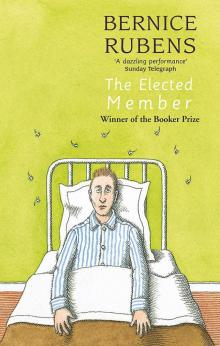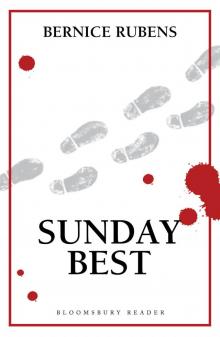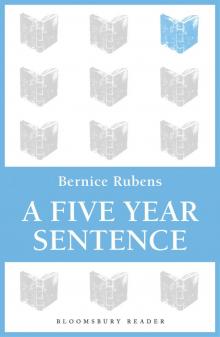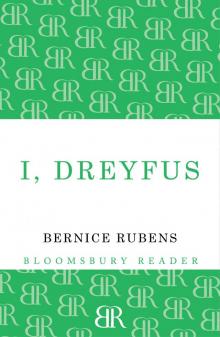- Home
- Bernice Rubens
Nine Lives Page 4
Nine Lives Read online
Page 4
I am cross. Someone has tried to steal my thunder. A guitar string is my signature. No one else’s. Anyway they caught him. He was tried and found guilty. He’s serving life. And serves him right. You don’t murder someone just for the kicks of it. You’ve got to have a pretty good reason. Good motivation. You have to be on a mission. Like me.
It’s been some time since my last sortie. Harry Winston and Angela Mayling are still on the back-burner and it looks as if they might stay there for a while. As usual, there were no witnesses and no fingerprints. As usual, patients have been questioned, in confidence, of course, but none of them seemed to have motive enough for murder. Was I lucky, I wondered. Or just very clever? Secretly, I believe that God is on my side. He knows that my mission is just.
I was ready for my next strike, and I wanted variation. I decided to alter my disguise radically. I would dress as a woman. It wouldn’t be the first time, but I’d never risked it abroad. It would be fun. And if I was witnessed, old Wilkins would have fresh fish to fry. I have access to frocks. Verry’s. She knows about this little hobby of mine and she gladly gives me free access to her wardrobe. Sometimes of an evening we sit together and dine or watch television, and I flounce my petticoats around her and we have a good laugh. She’s a real brick, my Verry. Never questions anything. Just goes along with it. Take Devon, for instance. That’s where I keep my fantasy client. But she really believes in him; asks me to bring her back some clotted cream. And I do. You can get it anywhere in London. I wouldn’t want to disappoint her. Verry’s just right for me.
To further vary my sorties, and to keep Wilkins on the hop, I chose to go to Wales. Barry Island, a seaside resort, not far from Cardiff. I could drive there and back in a day. My target was a Miss Bronwen Hughes. I knew she lived alone, because I’d read a profile about her in a professional journal. She was well thought of, apparently. On the downside, she claimed that she had never made a professional mistake. So that, even when called for, she would never apologise. Well, Miss Hughes, I thought, I’ll give you something to be sorry for.
I took a carrier-bag of Verry’s clothes and make-up, and I changed in my office. I left London very early, and happily reached the M4 by six o’clock. My appointment was for nine-thirty. I enjoyed that ride. Petticoats donate a certain freedom and often I fingered my flouncy skirt, and I was tempted more than once to get out of the car and twirl on the lay-by. But that would have to wait for my return journey when I could risk a service station, and mince my way around the self-service and eat like a lady.
I reached Barry Island just before nine o’clock. I parked my car by the sea, and strode down to the shoreline. I was tempted to take a paddle, to hook my skirt into my knickers and primp my hair, an inconspicuous brown wig. But it was too cold for a paddle and moreover I had omitted to shave my legs. Even in my disguise which, take it from me, could have fooled anybody, it would have been folly to take such a risk. So I idled around for a while then promptly turned up at Miss Hughes’ little cottage. I put on my gloves and rang the bell.
She answered the door herself. I could have done her there and then, in the hallway, as I had so briefly dispatched Miss Mayling, but I was feeling rather frisky. It must have been the sea air. I thought I’d let her have a small go at me.
She led me into her parlour and motioned me into a chair. Then she sat herself at her desk.
‘I have a note here,’ she said, ‘that I am expecting a Mr Henry Willes. That presumably is your name?’
So I hadn’t fooled her, after all. And I was none too pleased.
‘Well that’s my problem, you see,’ I said. ‘That’s why I need help. I’m obsessed, you see, with cross-dressing, and I’d like to … well … be cured.’
She stared at me with little sympathy.
‘Tell me about yourself,’ she said.
‘Like what?’ I asked.
‘When you were a child. What was that like?’
I started out on a fictitious childhood. I invented an abusive father and an alcoholic mother. I even threw in a grannie who was senile. I went on and on about my miserable childhood, and I wondered why she didn’t interrupt or say something. I suppose she wanted me to spill it all out, and then she might deign to offer a word of wisdom. But I wasn’t going to wait for that. Miss Hughes, however well thought of, was beginning to get on my nerves. It would be a pleasure to kill her.
But suddenly she actually spoke, looking at me with a certain interest and I thought I might as well grant her her say. She sorted through some papers on her desk and then passed one of them into my gloved hand. On it was a drawing, a sketch in black ink that stretched across the page and, to my eye, represented nothing.
‘What is that a picture of, do you think?’
‘Looks like a dragon,’ I said. ‘A bit like my grannie.’
It didn’t look like anything at all, but I thought that my interpretation would please her. And indeed it did, for she smiled. ‘Good,’ she said. ‘Now look at this one.’
Another drawing was delivered, this time patches of doodling spread across the page. Again I called on my fictitious grannie, and I said that it reminded me of Grannie’s knitting.
Miss Hughes smiled again. She had cottoned on to Grannie as a key figure.
‘Did she tell you stories when you were a child?’ she asked.
‘She told me the story of Little Red Ridinghood,’ I said. ‘I liked that one, and she told it often. I especially liked the part when the fox dressed up as the grannie. I used to laugh at that.’ I couldn’t have given Miss Hughes a clearer clue. But I was fed up with Grannie and I needed to be on my way. So I rose and took the string out of my bodice pocket. When she saw my weapon, she paled. She realised exactly what I was up to, and she attempted to flee, but after a few steps she froze in terror. I sat her down, and I went behind her and did the usual business. I was getting pretty good at it by now. I waited for her to snuff and I apologised to Wilkins for leading him such a merry dance. I left the house, uncaring whether or not I was seen, for no one would suspect a woman of such a crime. I twirled my skirt before getting into the car. On my way home, I ate lunch at a service station, and leaving the M4 I made a detour to a shop in Pimlico which sold clotted cream from Devon.
THREE DOWN. SIX TO GO.
It took five patients …
It took five patients to turn away from an unanswered bell, before the police were alerted. A neighbour had noticed the slow comings and quicker goings of the callers. PC Gower of the local force came to investigate and immediately put two and two together. Or rather, one and one. The psychotherapist and the guitar string. He was delighted and he was going to keep it to himself. He knew about the killings – all police authorities had been alerted, and he had heard about Detective Inspector Wilkins’ frustration. But bugger the DI, he thought. He was going to handle this one himself.
He reported his findings to the station. He would need their back-up. They all agreed that little Barry Island should go it alone. It would put the place on the map and be good for tourism. Though it would have to offer a lot more than a notorious murder to attract visitors. Barry Island was not exactly Palm Beach in Florida. But they couldn’t keep it out of the local papers, and shortly the news spread to Wilkins’ ear. And off he went down the M4 to investigate.
He had the grace to praise PC Gowers’ deductions and the constable had to be satisfied with that small acknowledgement. Together they visited the scene of the crime, and found what Wilkins expected to find. No sign of a break-in. Not a single fingerprint. And on questioning and house to house, not a single witness. Just a guitar string around a garrotted neck.
‘We have a serial killer on our hands,’ Wilkins announced on his return to London. Three murders following a similar pattern was enough to merit the term ‘serial’. It was time to call in the forensic psychologist.
Dr Arbuthnot was occasionally ashamed of himself, for he rarely got it right. In the case of a serial killer of old ladies, he had hazarded a man o
f brute strength who hated his mother. The confessing killer turned out to be a slender young woman who was an orphan. In another case of serial rape, he had diagnosed a middle-aged man of athletic build, who turned out to be a priapic seventeen-year-old boy. Occasionally he got it right, but only by making deductions that anyone of reasonable intelligence could have made without the benefit of medical training. To be fair to Dr Arbuthnot, in the case of the shrink killer he had little to work on. But he had a go, and came out with the declaration that the murderer was probably a psychotherapist himself, one who had been struck off the register. He had no connection to offer with regard to the guitar string or the irregular intervals between the attacks. He acknowledged that this was a significant factor but until and unless it repeated itself, he could draw no conclusions.
Wilkins then organised an investigation into all unfrocked psychotherapists. But there were precious few. Incompetence and criminal negligence in such a profession is very hard to prove. Witnesses tend to be patients, and their very need for therapy in the first place does not recommend their reliability.
Wilkins didn’t know where to turn. Inwardly he prayed for another killing, and even another, until a careless clue was left behind. He avoided the Chief Superintendent at the station and he dreaded the moment when he would be called into his office to give account. Once he bumped into him in the corridor, and he faltered in his steps.
‘Press on, Wilkins,’ the Chief said, as he passed him. ‘Press on,’ and he flashed him a smile.
The encounter afforded a margin of relief, but Wilkins had no idea how he could press on, and in what direction. In all three cases he had exhausted his inquiries. Most of the patients had willingly come forward, if only to express their indifference. But none had been actively hostile, hostile enough to commit murder. Until this time, the killer had chosen therapists who were on the professional register and Wilkins dreaded that he might well spread his net wider and include unauthorised healers, who were legion. He’d been deeply disappointed with Dr Arbuthnot’s report and he himself began to have doubts about the whole profession. His sister suffered from depression and she’d been in and out of therapists’ consulting rooms and on and off the couches of sundry psychiatrists for years, and much good had it done her – until her GP prescribed simple antidepressant pills and she now functioned fully like a normal person. Somebody out there had a grudge, Wilkins concluded, a bitter hatred against the whole profession. But where could he turn? How could he press on? He simply had to wait for the next assault.
I slept very badly …
I slept very badly again last night and felt unwell when I woke up. I didn’t think I could manage the journey to the prison. Donald would be disappointed, but I just didn’t feel up to it. I phoned the authorities to let them know why I wouldn’t be visiting, and also to tell Donald that it was only a cold and that I would be up and about in no time.
So I had a whole day in which to do nothing and I thought I’d pamper myself a bit. Stay in bed, look at television. Eat chocolate. So there was I, lying in bed, watching the breakfast show when my doorbell rang. Now I hardly get any visitors, especially since the trial. The journalists don’t come any more. I’m yesterday’s news. I wondered who it could be and the thought crossed my mind not to answer the door. But whoever it was rang again. And again. I got out of bed, and through the stained glass of the front door, I made out the shape of a woman. Confirmed by a feathered hat. I drew my dressing-gown around me, and without undoing the chain – I have to be extra careful nowadays – I opened the door a few inches, wide enough to find out what the caller wanted.
She was a good-looking woman, about my age – perhaps a little older. She smiled at me, a nervous smile, and I sensed she wanted a favour, though I could not imagine what good I could do for anybody. But I found myself willing to try. I was lonely and I welcomed company, whoever she was. But I didn’t unchain the door.
‘Can I help you?’ I asked.
‘It’s a delicate matter, Mrs Dorricks,’ she said. ‘Can I come in?’
‘You’re not from the newspapers, are you?’ I asked.
‘No,’ she said. ‘It’s a personal matter.’
I believed her, and I took the chain off the door.
‘Come in,’ I said, and led her into the kitchen. I had already decided to make her a cup of tea. Her voice was gentle and she seemed very friendly. I told her to sit down and I put the kettle on.
‘It’s a lovely day today,’ I said. I wanted to postpone learning the reason for her visit. I sensed it would be disturbing, and a cup of tea between us would make it more palatable. I set out the cups and put some biscuits on a plate.
‘That’s very kind of you,’ she said. ‘A cup of tea would be most refreshing.
I looked at her properly for the first time, and there was something familiar about her face. I knew I had seen it before, and often, but I couldn’t remember where. I kept it in my mind’s eye as I filled the teapot, and in a flash I saw her at Donald’s trial, sitting on the same bench, day after day. Not far from my own reserved place. Her visit clearly had to do with Donald and my curiosity was slightly piqued. I poured the tea for us both and offered her a biscuit. Then I settled myself down so that I faced her squarely, ready for anything she had to say. But nothing on earth could have prepared me for her introduction.
‘My name’s Emma,’ she said.
I envied her her confidence. With a name like Emma, so phonetic, so unvariable, self-confidence is assured.
‘I’m pleased to meet you, Emma,’ I said. I refrained from announcing myself.
‘Don’t you know of me?’ the woman asked.
‘I saw you at the trial,’ I said. ‘But I don’t know you. Should I?’
‘I’m Emma,’ she said again. ‘Emma Dorricks.’
I was confused. I knew practically nothing about Donald’s family. He might have had an aunt somewhere. Or cousins. I was heartened. There might be someone else to share my burden.
‘Dorricks,’ I said. ‘Then we must be related.’
‘Not really,’ she said. ‘Don’t you know about me?’ she asked again.
I shook my head, further confused.
‘Just like Donald,’ she said. ‘Kept his mouth shut on everything.’
I agreed with her, but still could not guess at her part in it.
‘I’m Emma Dorricks,’ she said again. ‘Donald’s first wife.’
I put down the biscuit I was holding in my hand. If I’d bitten on it, it would have choked me. But I took a gulp of tea to swallow the lump in my throat. A lump of astonishment rather than sorrow. I recalled our wedding day in the register office. There had been papers to sign and perhaps one of them may have noted a divorce. But I didn’t read them. I was too excited at the thought of my future. Then the thought occurred to me that perhaps Donald was a bigamist.
‘Were you divorced?’ My voice was wavering.
‘Oh yes,’ Emma said. ‘You’re absolutely legal.’
‘Any children?’ I asked. Another matter that I had to settle. I prayed that their union had been childless. I wanted something from Donald that nobody else had had.
‘No,’ she said. ‘Fortunately. Otherwise I would never have left him.’
‘You left him?’ I asked. How could any woman leave such a loving man? ‘But why?’
‘My fault. My fault entirely. And I regret it. But he was so clammed up all the time. We were together for two years, and in all that time he never talked about himself. Refused to answer questions. Told me there was nothing that I needed to know. I couldn’t stand it. I started to go out on my own. I met another man. One who never stopped talking. Within six months I knew all I wanted to know about him, and a lot more that I didn’t. I wished he’d shut up. I missed Donald’s silences and I longed for peace. But by then it was too late. He’d met you, he told me, and he wanted a divorce. I envied you then, I have to confess. He’s a good man is Donald. I can’t believe he’s guilty. Not Donald. He doesn’t have i
t in him.’
I warmed to the woman. She could easily become a friend and I looked forward to a sharing of our discontent.
‘Why have you come?’ I asked.
‘I want a favour,’ she said. ‘I’d like to visit him. I still love him, you know, in my own way. I watched him every day at the trial. I was full of regrets. I think he can’t have many visitors and he must be terribly lonely. But I need a permit to visit him so he has to be willing to see me. And I’m not too sure about that. So I’ve come to ask you to persuade him. To tell him about my visit. And all my regrets.’
I pictured Emma’s hand on the glass partition and for a moment, I resented her print over mine. ‘But I’m not supposed to know anything about you,’ I said.
‘But now you do. Please, please, I beg you. Just ask him to see me.’
‘But why do you want to see him so much? And after all this time?’
‘I never told him I was sorry,’ Emma said. ‘And I pity him.’
‘You mustn’t pity him,’ I said. ‘Pity is difficult to live with. I ought to know. I avoid it if I can.’
Emma had begun to cry. I poured her some more tea, trying not to pity her.
‘I’ll talk to Donald,’ I said. It was still early and I could still visit him. I could ring the prison and tell them I was coming after all.
Emma rose from the table. ‘Here’s my address and telephone number.’ She drew a piece of paper out of her bag. She had already prepared it. ‘Please, I beg you, be in touch with me. Even if you can’t persuade him,’ she said, ‘I’d like us to stay in touch.’
She was smiling at me, and I sensed she was as lonely as I was, but unlike me, her loneliness was aggravated by regret. I was glad I had little to be sorry for. I had been a good wife to Donald but only because he’d been a good husband to me. I told her I’d be in touch. I was anxious for her to leave. I had to prepare for my visit. She understood, straightened her hat and picked up her bag.
‘I wish you a good visit,’ she said.
As soon as she’d gone, I phoned the prison. I told them I felt much better and that I would be taking up my visiting permit.

 The Elected Member
The Elected Member Sunday Best
Sunday Best Nine Lives
Nine Lives Madame Sousatzka
Madame Sousatzka A Five Year Sentence
A Five Year Sentence I, Dreyfus
I, Dreyfus